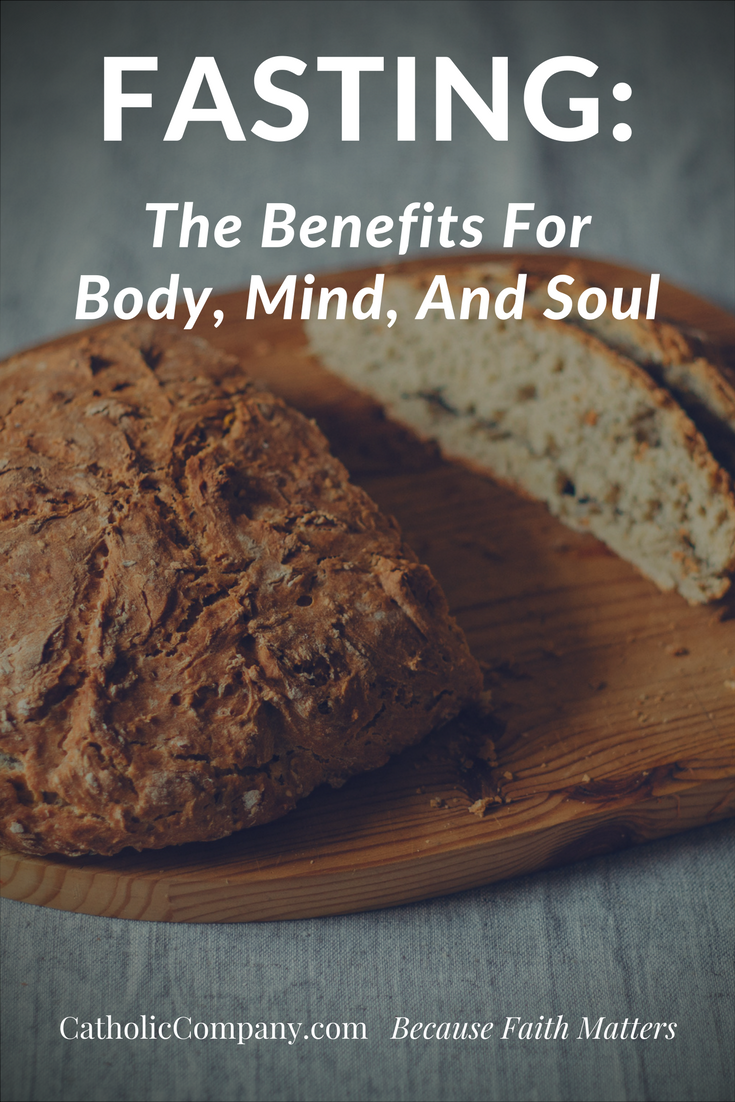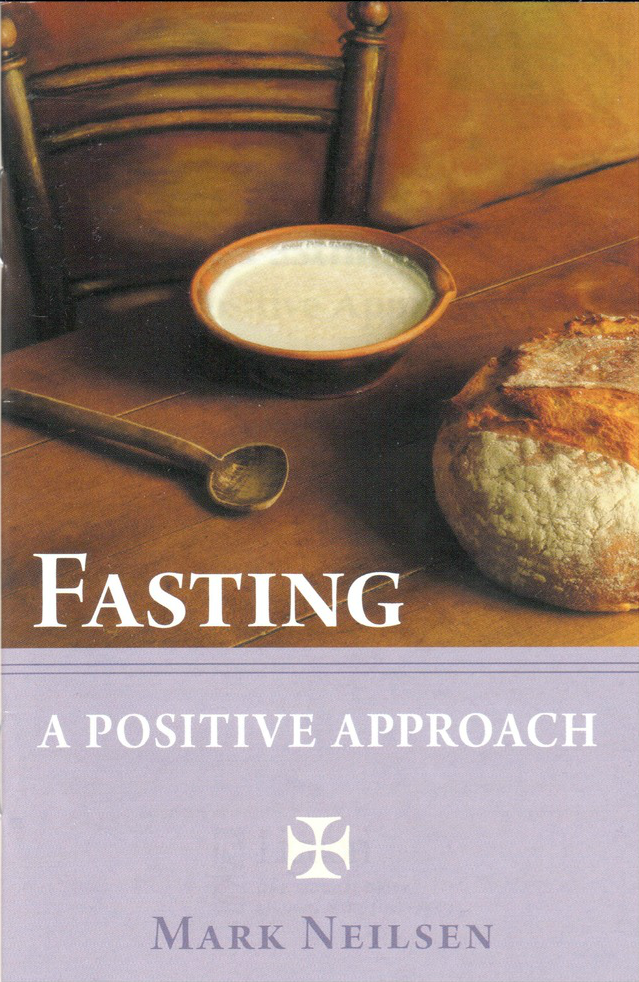Fasting: The Benefits For Body, Mind, And Soul
Mar 14, 2017 by Whitney Hetzel
I don't know about you, but I find it difficult to fast. While I know that the spiritual benefits of fasting are good for the soul, it doesn't make it any easier to do. We know that Christ himself fasted, and the Church has recommended it as a spiritual practice for over 2,000 years.
So why is it difficult? After reading about it and talking to a few friends who have made fasting a part of their spiritual habits for a long time, I have come to realize there is more to fasting than I had previously understood.
THE HEALTH BENEFITS OF FASTING
Recently fasting has gained popularity outside of its religious and spiritual applications. There was an article in the Wall Street Journal in February 2017, and a number of books have been written about utilizing fasting as a means to a healthy lifestyle.
It should not surprise us that fasting is beneficial to our bodies and our minds as well as our souls, since as human beings, we are made up of all three. When something benefits one of our faculties, it benefits all of them. The integration of body, mind, and soul is, in fact, a goal of many spiritual pursuits.
Actually, fasting has a long history as a healing tradition. Hippocrates (460-470 B.C.), widely considered the father of modern medicine, prescribed fasting as a treatment for many ills. Plutarch (46-120 A.D.) used fasting as a favored treatment saying, "Instead of using medicine, better fast today." Plato and Aristotle were also stalwart promoters of fasting.
Dr. Jason Fung, in his recent book, The Obesity Code, says that fasting holds many advantages over traditional diets, not just for weight loss or maintenance, but for total well-being. These advantages include its simplicity, its cost, its convenience, and most of all its power.
Fasting is powerful. Fung claims that fasting is the most efficient and consistent strategy to decrease insulin levels, a fact first noted decades ago. "All foods raise insulin; therefore the most effective method of reducing insulin is to avoid all foods" (Fung p. 242). Regular fasting, by routinely lowering insulin levels, has been shown to significantly improve insulin sensitivity. "This finding is the missing piece in the weight-loss puzzle" (Fung P. 240).
There are other reasons to fast for well-being, beyond weight loss. Some of the benefits of intermittent fasting include increased adrenalin, increased growth hormone (which helps to maintain muscle and bone tissue), reduced inflammation, and improved memory (Fung 241).
It has also been claimed that fasting produces clarity in thinking . . . especially when it is done during a period of 24 hours or more. "Think about how you feel after a big Thanksgiving meal . . . Are you mentally as sharp as a tack? Or dull as a concrete block? How about the opposite? Think about a time when you were really, really hungry. Were you tired or sluggish . . . I doubt it. You were likely hyper alert, and your senses sharp as a needle." Fung goes on to explain in his book, that animals are cognitively sharp and physically agile during times of food scarcity and have a clear advantage when it comes to survival.

THE SPIRITUAL BENEFITS OF FASTING
What does this have to do with spiritual fasting? I have thought about this a lot lately, maybe because I have finished Dr. Fung's book, but more likely because Lent is upon us and fasting has long been a part of Lent. Yet, perhaps because fasting is also a type of mortification, we can fall into the trap of believing (as I did) that its only spiritual benefit is as a penance; that if fasting doesn't involve "suffering" that it isn't spiritual.
Yet Jesus said, "My yoke is easy; my burden light." Our Savior invites all that labour and are heavy-laden, to come unto Him for rest for our souls. We shouldn't be afraid of His yoke. While it may require self-denial and exposure to difficulties, these are abundantly repaid, even in this world, by inward peace and joy. Mike Aquilina says in his book, A Year With the Church Fathers, "We are given the chance to be born all over again in Christ, and because of that gift we are no longer slaves to sin and death."
In Matthew 4:11 we hear of Jesus' fast in the desert. At the end of the 40-day fast, the devil tempts Jesus. It's interesting to note that Satan still uses food as a temptation . . . just as he did in the garden. The devil understands that hunger and loneliness are powerful things and he likes to make use of them. Yet Christ refuses. Jesus refuses to give in to temptation. There are things more important than his hunger:
"Man shall not live by bread alone, but by every word that proceeds from the mouth of God." He will not be tempted away from obedience to his Father by the grumbling in his stomach. As St. Irenaeus points out, it is here that Jesus is in effect reversing the Fall by giving the answer Adam and Eve ought to have given: "Thus the corruption of man, which happened in paradise by both Adam and Eve eating, was done away with by his lack of food in this world" (A Year with the Church Fathers).
If we understand that disorder flows from original sin, then we can see how many of our desires, although good in many ways, have become disordered. We want too much of them. Food is just one of those desires. Yet we can remember that Christ was tempted after a full 40 days of no food when his desire for food must have been tremendous. The very fact that Jesus has overcome temptation means that he won for us the grace to overcome ours as well. This should encourage us and give us hope.
The Church in her wisdom gives us the holy season of Lent, which is a time for us to fast and to give up the things we love. With those things out of the way, we can turn our attention toward God and remember Christ's own words, "Man shall not live by bread alone."
St. Thomas Aquinas identified three values in fasting; repression of one's concupiscence (strong or ardent desire) of the flesh, atonement for one's sins, and the disposing of oneself to higher things.

A PERSONAL PERSPECTIVE ON FASTING
I have a dear friend and spiritual mentor who fasts two days a week (and has done so for a long time). To better understand the spiritual effects of fasting, I decided to call her. It was a timely call because she said she had just been to see the doctor who had told her that he was amazed at the results of her recent blood work. Her good cholesterol levels were far above the average. He told her that whatever it was she was doing, to keep doing it. She is certain one of the reasons she is doing so well is that she fasts regularly.
My friend was quick to explain to me that the physical effects have nothing to do with why she fasts. I have known her for almost twenty years and I only know she practices regular fasting from food because I've asked her about it. She would never say anything or let others know that fasting is something she does on a regular basis. It is a private experience between her and God.
"Being able to fast is a gift from God. It has very little to do with me, " she said. "If you are able to fast, it is because God has given that gift to you. If you cannot fast because you are physically unable or are too old or for some other reason, it is because God has given you something else."
I asked her if she views her fasting as a kind of penance. "Fasting is less about penance and more about doing God's Will. You have to pray before you fast. You have to pray while you fast. Prayer and fasting go hand in hand. You start by saying to God, 'I want to do your Will, and then you ask Him to help you to see it."
Lent is also about discerning God's Will, she says. "Look at Jesus on the Cross. We are asked to do the same. How will we get there? Prayer and fasting are opportunities to offer back to God what He has given to us."
My friend also shares a word of warning: "Beware of pride. It's tempting to feel prideful when we first begin to fast; as if it is because we are strong or have terrific will-power that we are able to abstain."
She says this temptation to be prideful can rear its head when we fast regularly too. "But there can be no room for pride because ultimately it is not about us at all. Actually, fasting should bring us to the realization that we are in need of God's help in all we do. This is why prayer is such a crucial part of any fast."
My friend's words about fasting echo what the Church says. In a small pamphlet called, Fasting: A Positive Approach, the author explains that discovering the rewards of fasting is like finding a treasure in the attic. "Many Christians are now looking at the tradition as a means of spiritual growth."
Just as my friend said that fasting and prayer go hand in hand, so this small booklet explains what the Church has always proclaimed, "The purpose of fasting is to help the soul turn back to God through the conversion of the heart. We need to constantly ask the Spirit's help in teaching us how to fast as well as how to pray..." (Fasting, p.22).
This little pamphlet helps to differentiate fasting for physical and spiritual benefits. "Fasting may be good for the body by helping keep the pounds off and for the mind by freeing it from constant attention to physical desires and allowing for increased creativity and longer attention spans, yet as valuable as those things are, they are secondary to the spiritual growth that Christians seek in fasting" (Fasting, p. 24).
MY TAKEAWAY
As I prepared to write this post and I began to think about the topic, I realized that I tend to compartmentalize things. As a fitness blogger, I write about the benefits of exercise and good nutrition, and I also write about my Catholic faith. Yet when I am writing about something spiritual, I often clarify at the outset of the article ("...Hey folks I'm about to get spiritual now..." ). The truth is that there are many similarities between the topics of fitness and faith, regardless of whether they are subtle or obvious ones.
God does not compartmentalize. After all, He is the author of us all, and he created each of us with a body, a mind, and a soul. When we think more holistically, we can understand that fasting affects each of these aspects in positive ways.
It is good to remember that, while the Church sets aside days for fasting, She also has many days for feasting. After all, God gave us food to eat and many times in scripture we see Christ sharing food and drink with friends. In our efforts to understand the self-denial and sacrifice, we should also understand that celebration and rejoicing are important for our faith as well!
In conclusion, I've discovered that while fasting is difficult for me, it can also surprise me. As I fast, I find that I am more alert to the workings of the Holy Spirit. By "breaking through one of the central rhythms of our lives, we allow God a space in our hearts to act" (Fasting, p. 23). I believe that we can learn about God in a particular way when we fast because we are not bound by a meal or by the ordinary emphasis on food. This doesn't mean that we won't be hungry.
Fasting, in fact, reminds us that we are hungry. By taking away food that satisfies, we are left with the spiritual element and it is here that we discover how unsatisfying the temporal life can feel. It is here that we might recognize what God wants to feed us. When we detach from food, our senses often become sharper and we can better understand that God is the source of the only food that lasts forever.
Isn't that what we are truly hungry for? Isn't that what we are craving?

QUOTES FROM THE SAINTS ON FASTING
Throughout the history of the Church, many saints have encouraged the spiritual habit practice of fasting. Following are a few quotes from the saints to encourage us as we attempt to draw closer to our Lord during Lent:
"Our primitive rule states that we must pray without ceasing. If we do this with all the care possible — for unceasing prayer is the most important aspect of the rule — the fasts, the disciplines, and the silence the order commands will not be wanting. For you already know that if prayer is to be genuine, it must be helped by these other things; prayer and comfortable living are incompatible."
-Saint Teresa of Avila (1515 – 1582)
"The scripture is full of places that prove fasting to be not the invention of man but the institution of God, and to have many more profits than one. And that the fasting of one man may do good unto another, our Saviour showeth himself where he saith that some kind of devils cannot be cast out of one man by another 'without prayer and fasting.' And therefore I marvel that they take this way against fasting and other bodily penance."
-Saint Thomas More (1478 – 1535)
"And let them fast from the Feast of All saints until Christmas. Indeed may those who voluntarily fast the holy lent, which begins at Epiphany and for the forty days that follow, which the Lord consecrated with His own holy fast, be blessed by the Lord, and let those who do not wish to do so not be constrained. But let them fast the other lent until the day of the Resurrection of the Lord. At other times however they are not bound to fast, except on Fridays. Indeed in time of manifest necessity the friars are not bound to the corporal fast."
-Saint Francis of Assisi (1181/1182 – 1226)
"Prayer, mercy and fasting: These three are one, and they give life to each other. Fasting is the soul of prayer; mercy is the lifeblood of fasting. Let no one try to separate them; they cannot be separated. If you have only one of them or not all together, you have nothing."
-Saint Peter Chrysologus (c. 380 – c. 450)
Read next The Inseparable Link Between Prayer, Fasting, and Mercy: A Homily by St. Peter Chrysologus







